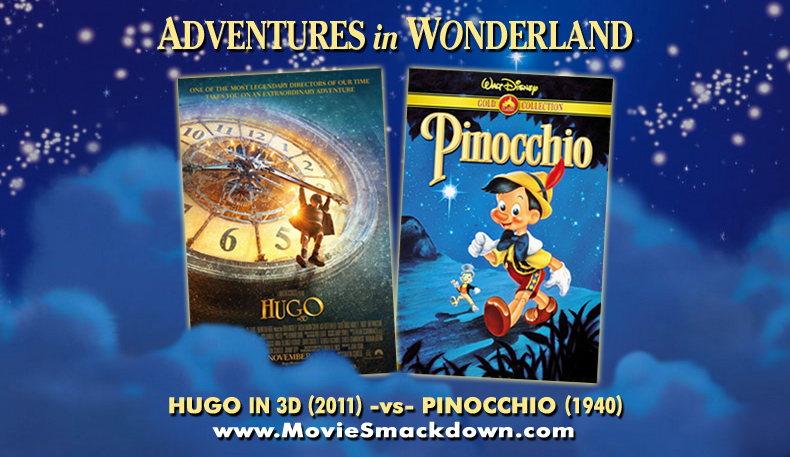
The Smackdown
Walt Disney and Martin Scorsese — two names that stand out in the pantheon of cinema legends. Both have made indelible contributions both to the world of film and to popular culture. Now, for the first time ever, they’re in the same weight class, so we’re bringing them together for what’s sure to be a classic Smackdown.
Don’t be fooled by the size and ages of the two title characters from their films in this bout. While they may be young boys, on their own, looking for their purpose in this crazy world, they each pack a Pacquiao-style punch in more than one department. Cinematically, technically and narratively, their stories are both groundbreaking and larger than life.
Fighting out of the Scorsese corner is Hugo, the legendary director’s new effort and his first foray into broad, family-friendly fare. Representing the formidable Disney empire is the second full-length animated classic produced by the House of Mouse, Pinocchio. Both stories originated from the literary world. Now, brought to life head-to-head on the big screen, only one can rule this boys’ clubhouse. And don’t say you know which it will be, or your nose might start growing.
The Challenger
Based on the book “The Invention of Hugo Cabret†by Brian Selznick (yes, that Selznick family), Hugo follows the tale of the titular orphan boy (Asa Butterfield), who lives within the walls of a Paris train station, caring for all the clocks in the building. When not tending timepieces, Hugo keeps the memory of his father alive by trying to repair an old automaton that they formerly worked on together. In an effort to get a part for this robot-like companion, Hugo gets caught stealing from the station’s toy-shop owner, played by Ben Kingsley. From there on out, we’re taken on an adventure with Hugo and his friend Isabelle, as they come to learn, both literally and figuratively, that every broken machine can be fixed with the right parts.
The film starts slowly, forcing us through a complex setup before we get to the guts of the mechanism. Luckily, we get Scorsese’s masterful use of 3D and superb performances from Butterfield, Sacha Baron Cohen, young Chloe Moretz and Kingsley, plus a nice little cameo from Jude Law, to hold us over. Soon enough, when the script by John Logan (Gladiator, Rango) begins to delve a bit into the history of cinema — a subject about which Scorsese has always been passionate — and how that rich history ties into the characters’ lives, you begin to realize you are clearly under the spell of great storytellers.
In an attempt to keep this review spoiler-free, let me just say that Scorsese puts on a clinic with this film, showing us the future of the medium by telling us a little about its past in such a visually and mentally stimulating way that the effect virtually guarantees Hugo’s future status as a classic of our time.
The Defending Champion
Adapted by a team of writers from the Italian children’s novel by Carlo Collodi, Disney’s Pinocchio follows the adventures of a little wooden figure carved by Geppetto, who wishes upon a star that the puppet would become a real boy. While Geppetto sleeps, a blue fairy appears in his workshop, brings Pinocchio to life and promises that one day he can be a real boy if he can prove himself to be brave, truthful and unselfish. Accompanied by his conscience, Jiminy Cricket, Pinocchio encounters a dubious menagerie of characters who lead him into trouble, but in the end, after trials and tribulations both incredibly imaginative and terrifyingly real to young viewers, the puppet’s concern for Geppetto over his own well-being earns his humanity.
As the Disney marketing team doesn’t let us forget, Pinocchio is a classic, and deservedly so. Generations have connected with this story for decades, which is why we seemingly have a new version of it released on Blu-ray/dvd/laserdisc every few years before it’s stashed away back in the Disney vault. It’s a fun family film with an enduring soundtrack and a solid message for its young audience, much of which, now grown to adulthood, still finds it chilling to think that if they had been bad boys who drank, smoked, swore and played pool, they might have been sent away and turned into donkeys.
The Scorecard
The trailer for Hugo is quite deceptive. I went in expecting a whimsical movie that would take its audience on an imaginative adventure but soon realized that, though the imagination is there in spades, Hugo’s adventure plays out in the confines of an enclosed train station and his own mind. In fact, a portion of the story comes straight from the pages of history. This is no fantasy; it’s a quasi-mystery. Yet I wasn’t the least bit disappointed with what I got in the end.
Pinocchio was the opposite. You know what you’re getting with that movie from the get-go. Wooden boys coming to life, talking (and singing) crickets, and a whale of a story that is at times almost biblical in its morality and its scope. This is the sort of stuff that can exist only in the imagination—and a very active one at that. So in terms of the whimsy factor, Disney wins this round.
Both films have technological merit. At the time of its release, no animation was as highly realistic as Pinocchio. The detail in the waves, the sparkle of the blue fairy’s wand, the movement of Stromboli’s wagon—all of it was years ahead of its time. Similarly, Scorsese tackle 3D in a way that enhances the colors of the whole production. Even the darkest colors seem to pop vividly. Using 3D is risky, because as we’ve seen all too often, it can come off as cheesy or campy. But that was not the case here, where the 3D gives each scene an extra layer of depth, very much like the effect animations of Pinocchio.
Because children’s movies can have a big role in molding young minds, filmmakers have a responsibility above and beyond entertainment. Pinocchio teaches kids not to lie, talk to strangers or skip school. Also, that it’s important to think about others’ well-being from time to time. Hugo acknowledges that kids have got already got the basics down pat, so it goes deeper. The message I got was that sometimes life gives you the short end of the stick, but with the help of those close to you, it’s our job to persevere. When the toy-shop owner in the film says, “My life has taught me one lesson: Happy endings only happen in the movies,†Hugo responds, “The story’s not over yet.†That’s an important lesson to hear, especially for kids, who can easily become overwhelmed by life’s challenges.
The Decision
We love few things around here more than putting a new movie up against a classic, especially when the classic has been rightfully placed on countless critics’ “Best†lists over the years. But having Martin Scorsese as the challenger helps level the playing field. Pinocchio may be a classic, but for me, Scorsese’s groundbreaking use of 3D technology and the twists and turns Hugo provides turn out to be a lot more satisfying than wishing upon a star (even though, for the record, that song is timeless). As much as I have a soft spot for all things Disney, and as great as Pinocchio is, I’m giving this victory to the film that has more relevance and immediacy to modern audiences, and that film is Hugo.





Walt Disney spins in his grave! Ha ha. HUGO was indeed a very well crafted film, but I wonder about its appeal to non-movie geeks who don’t necessarily worship Melies. I also found Scorsese’s touch to be a bit heavy for this material, which in the end is basically a kids movie.
As usual, this is a fine review by Ben but I’m going to have to disagree and cast my vote for PINOCCHIO.
When my first son, Jonathan, was a toddler and movies were still on VHS, I think we wore out about three copies of Pinocchio. He had some kind of weird fixation on seeing once a day for many months it seems. I think I’ve seen it twenty times with him. When he gets turned into a donkey scares me to this day…